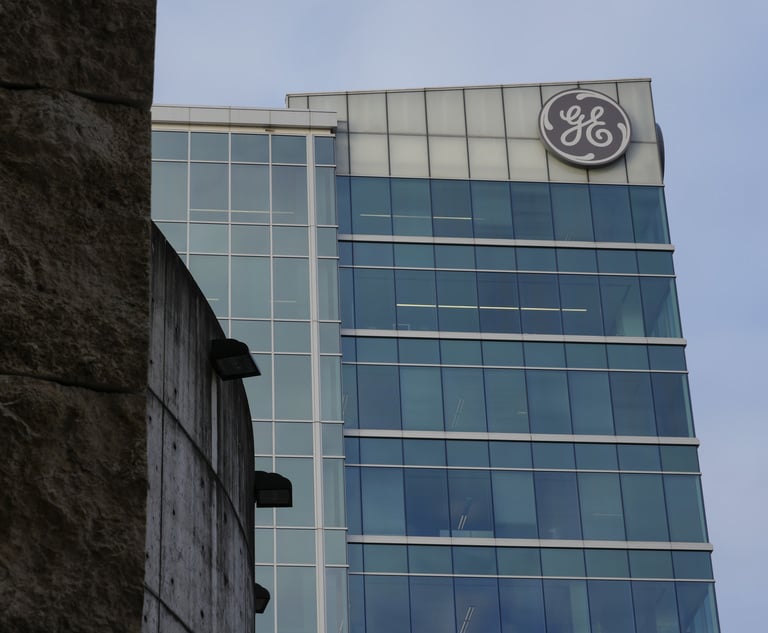Second Circuit Affirms Dismissal of Suit Against Facebook Over Hamas Attacks
The litigation was brought by a series of people who were either victims of attacks by Hamas and its supporters in Israel, or represented the estate of someone killed in an attack.
July 31, 2019 at 01:48 PM
5 minute read

The U.S. Court of Appeals for the Second Circuit on Wednesday threw out a lawsuit against Facebook by individuals who claimed the social networking site unlawfully provided a way for associates of Hamas, a fundamentalist group in the Middle East which has been designated by the U.S. government as a terrorist organization, to encourage acts of violence.
The litigation was brought by several persons who said they were either victims of attacks by Hamas and its supporters in Israel, or represented the estate of someone killed in an attack.
They claimed in a lawsuit filed three years ago that Facebook failed to remove content posted by members of Hamas that was intended to encourage and celebrate acts of terrorism in Israel and that the social networking website's algorithms directed that content to others, who then perpetrated further attacks.
The trial judge in the case, U.S. District Judge Nicholas Garaufis of the Eastern District of New York, granted a motion by Facebook to dismiss the lawsuit, which was appealed by the plaintiffs.
Now a Second Circuit panel has affirmed that decision saying that a section of federal law barred Facebook from being held liable for the attacks.
“Here, plaintiffs' allegations about Facebook's conduct do not render it responsible for the Hamas‐related content,” the court said. “As an initial matter, Facebook does not edit (or suggest edits) for the content that its users—including Hamas—publish.”
Facebook was represented to defend the appeal by Craig Primis, a partner at Kirkland & Ellis in Washington. Primis wasn't immediately available for comment. Representatives for Facebook did not immediately return a request for comment.
Primis had argued that a section of federal law, enacted by the Communications Decency Act more than two decades ago, shielded Facebook from civil liability related to the attacks by Hamas and its supporters. That argument prevailed with the panel of judges, which included Chief Judge Robert Katzmann, and Circuit Judges Christopher Droney and Richard Sullivan.
The conflict in the case was whether Facebook should be treated as the publisher or speaker of the information provided by Hamas and its supporters on the website.
The plaintiffs alleged that Facebook should be held liable for “aiding and abetting Hamas's acts of international terrorism” under a section of federal law on civil remedies. That law, 18 U.S.C. § 2333, allows civil litigation to seek damages after an act of international terrorism.
Facebook, they claimed, was used by members of Hamas or the group's supporters to encourage acts of terrorism in Israel. A series of attacks ensued that they directly attributed to the content posted on the social networking site.
Chaya Zissel Braun, an infant, was killed at a train station in Jerusalem when a Hamas operative drove a car into a crowd, for example. The suit claimed that the attack happened after members of Hamas and their supporters shared posts on Facebook encouraging car-ramming attacks at light rail stations.
Yaakov Naftali Fraenkel, a teenager, was kidnapped by a Hamas-affiliated operative while walking home from school and later shot to death. The kidnapping happened after members of Hamas and their supporters posted messages on Facebook advocating for Israeli soldiers to be kidnapped, according to the suit.
The plaintiffs alleged that Facebook failed to remove pages and associated content of certain Hamas leaders, spokesmen and other members before the attacks. They also claimed that the website's algorithms directed the content to the personalized newsfeeds of the individuals who perpetrated the attacks.
Facebook had argued before the district court and the Second Circuit that a section of federal law made the company immune to the plaintiff's claims of liability. The law, 47 U.S. Code § 230, effectively says that a “publisher” of information can't be held liable for the result of any content posted.
The plaintiffs had argued that Facebook was not acting as a protected publisher of information, which isn't defined by the law, and that the challenged information was provided both by Hamas and Facebook through its algorithms, which they said would open the website to liability.
The Second Circuit wrote that, while the statute doesn't spell out what should be considered a “publisher,” Facebook's actions should be interpreted to fit that role. The court also rejected an argument from the plaintiffs that claimed Facebook is not a “publisher” because it uses algorithms to distribute content.
“Arranging and distributing third‐party information inherently forms 'connections' and 'matches' among speakers, content, and viewers of content, whether in interactive internet forums or in more traditional media,” the court said. “That is an essential result of publishing.”
The Second Circuit's opinion was written by Droney. Katzmann dissented against a large part of the decision that relieved Facebook of liability based on federal law.
The plaintiffs in the case were presented by Meir Katz from The Berkman Law Office in Brooklyn. Katz did not immediately respond to a request for comment Wednesday.
READ MORE:
This content has been archived. It is available through our partners, LexisNexis® and Bloomberg Law.
To view this content, please continue to their sites.
Not a Lexis Subscriber?
Subscribe Now
Not a Bloomberg Law Subscriber?
Subscribe Now
NOT FOR REPRINT
© 2024 ALM Global, LLC, All Rights Reserved. Request academic re-use from www.copyright.com. All other uses, submit a request to [email protected]. For more information visit Asset & Logo Licensing.
You Might Like
View All
NY Appellate Panel Cites Student's Disciplinary History While Sending Negligence Claim Against School District to Trial

The American Disabilities Act, Sovereign Immunity and Individual Liability
7 minute read
GE Agrees to $362.5M Deal to End Shareholder Claims Over Power, Insurance Risks
2 minute read
Judge Denies Sean Combs Third Bail Bid, Citing Community Safety
Trending Stories
Who Got The Work
Michael G. Bongiorno, Andrew Scott Dulberg and Elizabeth E. Driscoll from Wilmer Cutler Pickering Hale and Dorr have stepped in to represent Symbotic Inc., an A.I.-enabled technology platform that focuses on increasing supply chain efficiency, and other defendants in a pending shareholder derivative lawsuit. The case, filed Oct. 2 in Massachusetts District Court by the Brown Law Firm on behalf of Stephen Austen, accuses certain officers and directors of misleading investors in regard to Symbotic's potential for margin growth by failing to disclose that the company was not equipped to timely deploy its systems or manage expenses through project delays. The case, assigned to U.S. District Judge Nathaniel M. Gorton, is 1:24-cv-12522, Austen v. Cohen et al.
Who Got The Work
Edmund Polubinski and Marie Killmond of Davis Polk & Wardwell have entered appearances for data platform software development company MongoDB and other defendants in a pending shareholder derivative lawsuit. The action, filed Oct. 7 in New York Southern District Court by the Brown Law Firm, accuses the company's directors and/or officers of falsely expressing confidence in the company’s restructuring of its sales incentive plan and downplaying the severity of decreases in its upfront commitments. The case is 1:24-cv-07594, Roy v. Ittycheria et al.
Who Got The Work
Amy O. Bruchs and Kurt F. Ellison of Michael Best & Friedrich have entered appearances for Epic Systems Corp. in a pending employment discrimination lawsuit. The suit was filed Sept. 7 in Wisconsin Western District Court by Levine Eisberner LLC and Siri & Glimstad on behalf of a project manager who claims that he was wrongfully terminated after applying for a religious exemption to the defendant's COVID-19 vaccine mandate. The case, assigned to U.S. Magistrate Judge Anita Marie Boor, is 3:24-cv-00630, Secker, Nathan v. Epic Systems Corporation.
Who Got The Work
David X. Sullivan, Thomas J. Finn and Gregory A. Hall from McCarter & English have entered appearances for Sunrun Installation Services in a pending civil rights lawsuit. The complaint was filed Sept. 4 in Connecticut District Court by attorney Robert M. Berke on behalf of former employee George Edward Steins, who was arrested and charged with employing an unregistered home improvement salesperson. The complaint alleges that had Sunrun informed the Connecticut Department of Consumer Protection that the plaintiff's employment had ended in 2017 and that he no longer held Sunrun's home improvement contractor license, he would not have been hit with charges, which were dismissed in May 2024. The case, assigned to U.S. District Judge Jeffrey A. Meyer, is 3:24-cv-01423, Steins v. Sunrun, Inc. et al.
Who Got The Work
Greenberg Traurig shareholder Joshua L. Raskin has entered an appearance for boohoo.com UK Ltd. in a pending patent infringement lawsuit. The suit, filed Sept. 3 in Texas Eastern District Court by Rozier Hardt McDonough on behalf of Alto Dynamics, asserts five patents related to an online shopping platform. The case, assigned to U.S. District Judge Rodney Gilstrap, is 2:24-cv-00719, Alto Dynamics, LLC v. boohoo.com UK Limited.
Featured Firms
Law Offices of Gary Martin Hays & Associates, P.C.
(470) 294-1674
Law Offices of Mark E. Salomone
(857) 444-6468
Smith & Hassler
(713) 739-1250






